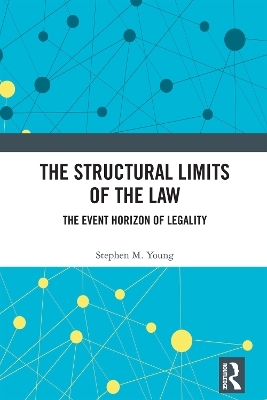
The Structural Limits of the Law
The Event Horizon of Legality
Seiten
2024
Routledge (Verlag)
978-1-032-77581-4 (ISBN)
Routledge (Verlag)
978-1-032-77581-4 (ISBN)
This book examines how, in response to crises, law tends to construct singular ‘events’ that obscure the underlying structural causes that any adequate response needs to acknowledge and to address.
This book examines how, in response to crises, law tends to construct singular ‘events’ that obscure the underlying structural causes that any adequate response needs to acknowledge and address.
Litigation is the main legal process that constructs events through a narrative that describes what happened and prescribes what should happen. Courts are theatres with competing stories and intense controversies. The legal event is compelling. But, through the examination of several cases from a range of jurisdictions, this book argues that the ability to construct and reconstruct legal events is so strong, appealing, and powerful that it limits our ability to engage in structural analysis. The difficulty of seeing beyond what is here called ‘the event horizon of legality’ interprets aspects of life as exceptional rather than structural, as it focuses attention on a limited range of possible causes, and so a limited range of possible interventions. So, if issues like famine, obesity, poverty, a rising cost of living, and climate change are even partially produced through non-eventful modalities of power, like colonialism, imperialism, or global capitalism, then, as this book analyzes, the event horizon of legality can only ensure that those issues continue. The book therefore calls for a critical re-evaluation of the role of law in shaping our representation of, and response, to crises; and so, for a rethinking of the power and promise of law.
This original analysis of the operation of law will appeal to sociolegal scholars and legal theorists, as well as others working in relevant areas in critical and social theory.
This book examines how, in response to crises, law tends to construct singular ‘events’ that obscure the underlying structural causes that any adequate response needs to acknowledge and address.
Litigation is the main legal process that constructs events through a narrative that describes what happened and prescribes what should happen. Courts are theatres with competing stories and intense controversies. The legal event is compelling. But, through the examination of several cases from a range of jurisdictions, this book argues that the ability to construct and reconstruct legal events is so strong, appealing, and powerful that it limits our ability to engage in structural analysis. The difficulty of seeing beyond what is here called ‘the event horizon of legality’ interprets aspects of life as exceptional rather than structural, as it focuses attention on a limited range of possible causes, and so a limited range of possible interventions. So, if issues like famine, obesity, poverty, a rising cost of living, and climate change are even partially produced through non-eventful modalities of power, like colonialism, imperialism, or global capitalism, then, as this book analyzes, the event horizon of legality can only ensure that those issues continue. The book therefore calls for a critical re-evaluation of the role of law in shaping our representation of, and response, to crises; and so, for a rethinking of the power and promise of law.
This original analysis of the operation of law will appeal to sociolegal scholars and legal theorists, as well as others working in relevant areas in critical and social theory.
Stephen M. Young is a Senior Lecturer in Law at the University of Otago, New Zealand.
Introduction: Events, Orders, and Borders 1. Legal Events: The Interrelated Construction of Individual and Political Bodies 2. Domestic Bodies, Criminal Bodies: the McGirt event 3. Mining Progress in International Law: the Nevsun event 4. Farming the Fruits of Empire: the Strathboss event 5. Hierarchical Reconstruction, Circulating Devaluation 6. Resisting Authority, Constructing Hierarchy 7. Remarks
| Erscheinungsdatum | 10.07.2024 |
|---|---|
| Verlagsort | London |
| Sprache | englisch |
| Maße | 156 x 234 mm |
| Gewicht | 539 g |
| Themenwelt | Recht / Steuern ► Allgemeines / Lexika |
| Recht / Steuern ► EU / Internationales Recht | |
| Sozialwissenschaften ► Politik / Verwaltung ► Politische Theorie | |
| ISBN-10 | 1-032-77581-5 / 1032775815 |
| ISBN-13 | 978-1-032-77581-4 / 9781032775814 |
| Zustand | Neuware |
| Haben Sie eine Frage zum Produkt? |
Mehr entdecken
aus dem Bereich
aus dem Bereich
ein Vortrag
Buch | Softcover (2024)
Suhrkamp (Verlag)
CHF 13,95
Geschichte, Vordenker, Organisationen
Buch | Softcover (2023)
C.H.Beck (Verlag)
CHF 18,90


